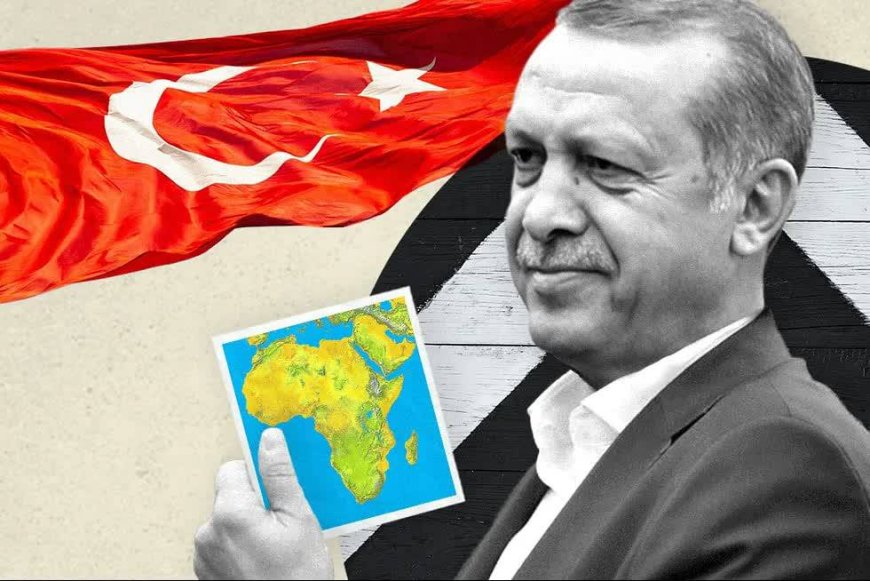Turkey's Strategic Pivot to Africa: A Paradigm Shift in Diplomatic Engagement?
In the annals of political history, the last decades of the 20th century witnessed a profound recalibration of Turkey's foreign policy trajectory. Long fixated on its elusive European Union aspirations, Turkish politicians pivoted decisively towards the burgeoning continent of Africa. The initial overtures towards Europe were met with a litany of disappointments and rebuffs, prompting Ankara to cast its gaze towards the untapped potential of the African continent.

The seminal moment arrived in 1998 with the unveiling of the visionary "Action Plan for Africa," a meticulously crafted blueprint that laid the foundation for a multifaceted engagement strategy. However, it was not until 2005, under the auspices of the AKP administration, that the plan began to materialize in earnest. Embodied within this strategic framework were pillars of economic synergies, cultural exchanges, and educational collaborations, which bore fruit in the form of an exponential surge in bilateral trade between Turkey and Africa. In a mere span of two decades, trade volumes burgeoned from a modest $5 billion in 2003 to a staggering $40 billion in 2022, a testament to the efficacy of Ankara's outreach efforts.
The economic entente between Ankara and Africa stands as a testament to the transformative power of proactive diplomacy. Turkish contractors now preside over construction projects exceeding $85 billion, underscoring Turkey's burgeoning footprint on the African landscape. Noteworthy, too, is the burgeoning connectivity facilitated by Turkish Airlines, which now services over 60 destinations across the continent, fostering greater people-to-people exchanges.
Central to Turkey's overtures is a commitment to share its developmental blueprint, predicated on principles of political parity, reciprocal economic growth, and enduring social partnerships. In stark contrast to the neocolonial vestiges that have marred previous interactions, Ankara's approach emphasizes egalitarianism and mutual empowerment, eschewing the trappings of asymmetrical dependencies.
A pivotal nexus in the burgeoning Turkey-Africa axis is the shared aspiration for a reformed global governance architecture. African leaders, disenchanted with the hegemony of Western-dominated institutions, have found a resonant ally in Turkey's advocacy for a more equitable international order. Turkish President Erdogan's impassioned pleas for restructuring institutions such as the International Monetary Fund and the World Bank have struck a chord with African counterparts, echoing their own calls for a recalibration of the global power paradigm.
Turkey's foray into Africa is not merely a strategic gambit but a moral imperative, framed within the contours of humanitarian stewardship. Ankara's overtures are underpinned by a commitment to fostering enduring partnerships, devoid of hegemonic overtones. The proliferation of Turkish embassies across the continent, a tenfold increase from 2002 to 2022, underscores Ankara's steadfast commitment to deepening its diplomatic footprint in Africa.
Moreover, Turkey's soft power overtures, manifested through humanitarian endeavors, cultural diplomacy initiatives, and educational scholarships, have garnered widespread acclaim across the continent. The proliferation of Turkish language and cultural programs, coupled with burgeoning educational exchanges, attests to Ankara's earnest efforts to cultivate a lasting bond with African nations.
In tandem with its soft power arsenal, Turkey has also leveraged hard power tools to bolster its engagement with African nations. The strategic deployment of defense diplomacy, epitomized by the sale of advanced weaponry and the establishment of military bases, underscores Ankara's commitment to enhancing security cooperation across the continent. Noteworthy is the establishment of the TURKSOM military base in Mogadishu, a testament to Turkey's deepening security ties with Somalia.
Turkey's overtures in Africa, epitomized by free trade agreements and infrastructural investments, underscore Ankara's pivot towards a more equitable and inclusive global order. By championing the mantra of "African issues need African solutions," Turkey has positioned itself as a stalwart advocate for the marginalized and disenfranchised, transcending traditional geopolitical paradigms.
As Turkey's diplomatic overtures in Africa continue to yield dividends, the prospects for a burgeoning partnership remain tantalizingly bright. The confluence of historical imperatives, strategic foresight, and a commitment to mutual empowerment augur well for a transformative alliance that transcends mere economic transactions. In an era fraught with geopolitical uncertainties, Turkey's strategic pivot to Africa stands as a beacon of hope, heralding a new chapter in international diplomacy.













































